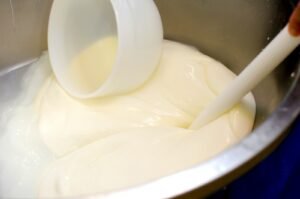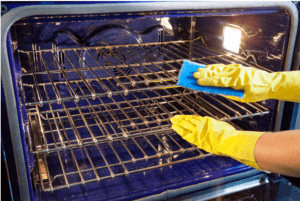
How to Make Buttermilk from Milk: A Simple Guide for Every Home Cook
Ever started a baking recipe and realized you’re out of buttermilk? Credits: Maryam Sicard | Unsplash There’s nothing quite like

Baby Bunnies – Uniquely made creatures. Do you know that baby bunnies are born deaf, blind, and without fur? Shocking, right?
Anyway, it is likely that you’re reading this because you just got a baby bunny or your bunny just gave birth to baby bunnies (kits), and you’re unsure about what they eat. Well… you’ve come to the right place!
Nutrition is a very important aspect of the growth of baby bunnies. This is because their diet significantly impacts their growth, development, and overall health. Nutrition helps them to:
Overall, nutrition must always be considered to maintain baby bunnies.
PS: if you are a pet owner, you should check our cool and very affordable pet products.
For the first 0-3 weeks of their lives, baby rabbits rely solely on their mother’s milk. This is because the mother’s milk is enriched with all the essential nutrients they need, and in the right proportions, proteins, fats, vitamins, and antibodies. It boosts their immune system by passing on protective antibodies from the mother. The milk also supports gut health and helps establish good digestion early on.
In cases where the baby rabbits (bunnies) are orphaned, vet-recommended alternatives like Kitten Milk Replacer (KMR) or goat’s milk are essential. Although formula can be good, the mother’s milk is a lot easier to digest, and it also reduces the risk of diarrhea or bloating. Overall, mother’s milk is vital for survival, strong development, and emotional bonding with the mother.
P.S: Cow’s milk is a no-no in feeding baby rabbits because it leads to improper digestion and bloating.
Weaning is the gradual process of moving baby bunnies from a milk-only diet to solid foods like hay and pellets. This usually begins around 3 weeks of age and continues until 6-8 weeks, depending on the rabbit’s health and growth rate.
This stage follows a process to aid in proper transitioning and digestion of food:
The bunnies still actively nurse from their mother but begin nibbling on solid foods, especially hay and pellets. Alfalfa hay is ideal because it is high in calcium and protein, which supports rapid growth. Small amounts of alfalfa-based pellets can be introduced alongside hay.
At this stage, solid foods become a bigger part of the bunny’s diet. Nursing starts to decrease naturally as they eat more hay and pellets. Also, their digestive system begins adjusting to fiber-rich food; this is when their first real poop (not just cecotropes) starts to form regularly.
By now, the baby bunnies should be fully off milk and eating a solid diet of alfalfa hay, water, and a measured amount of pellets. At this point, they are ready to slowly transition to an adult rabbit diet (switching to timothy hay and fewer pellets).
Note: Do not add fruits and vegetables to their meals yet at 3-6 weeks because their digestive system isn’t ready. Also, sudden changes in food or overfeeding pellets can cause diarrhea or bloating. Lastly, clean water must always be available.
From around 3 weeks of age, baby bunnies begin to nibble on solid foods, and the best place to start is alfalfa hay. Alfalfa hay is rich in protein, calcium, and fiber, all of which are vital for healthy bone growth, strong muscles, and proper digestion during early development.
Unlike timothy hay, which is better suited for adult rabbits, alfalfa provides the extra nutrients young kits (baby bunnies) need while they’re still growing. Alongside hay, it is important to introduce alfalfa-based pellets. These specially formulated pellets are dense with nutrition and help support weight gain and energy levels in young rabbits. However, they must be plain and clean, no seeds, colored bits, or sugary extras, as these can upset the kits’ stomachs.
Together, alfalfa hay and alfalfa-based pellets are the backbone of a kit’s weaning diet. They encourage chewing, which promotes dental health while also training the digestive system to handle solid food safely.
As simple as this looks and sounds, it is a very essential need for kits (baby bunnies). From a young age, kits need constant access to fresh, clean water. As they begin to nibble on hay and pellets, water becomes crucial for hydration and healthy digestion. It helps move food through their delicate digestive systems and keeps them from becoming dehydrated, especially during warmer months. It does not matter what is used, a water bottle or a bowl, just ensure it is cleaned daily and always filled.
While leafy greens are an important part of a rabbit’s long-term diet, they should not be introduced to kits until around 12 weeks of age. Before then, their digestive systems are still developing, and introducing vegetables too early can lead to gas, bloating, or dangerous diarrhea. Once they are ready, start with small amounts of mild greens like romaine lettuce, cilantro, or parsley, introducing only one new vegetable at a time to monitor how their body reacts.
According to a study by the House Rabbit Society, over 60% of gastrointestinal issues in young rabbits are linked to sudden dietary changes, especially when vegetables are added too early or in large amounts. Always wash greens thoroughly to remove pesticides, and never feed iceberg lettuce, as it contains lactucarium, which can upset a rabbit’s stomach. With slow introduction and close observation, leafy greens can become a healthy, fiber-rich addition to a bunny’s balanced diet.
Early Sugary and starchy foods may seem harmless, but they can be dangerous for kits (baby bunnies) whose digestive systems are still developing. They cannot properly digest high-carb foods like fruits, carrots, bread, or grains. When these foods are introduced too early, the undigested sugars and starches ferment in the gut, feeding harmful bacteria and leading to conditions like gas, bloating, and extreme diarrhea.
A study published in Frontiers in Veterinary Science found that baby rabbits fed high-starch, low-fiber diets had significantly higher mortality rates between 28 and 49 days old compared to those on a fiber-rich diet.
Furthermore, research by the British Small Animal Veterinary Association reports over 40% of rabbits on sugary diets develop dental and digestive issues. While occasional fruits can be safe for adult rabbits in moderation, they should be strictly avoided in kits (baby rabbits).
Kits (baby rabbits) are known to have very sensitive digestive systems, and sudden changes in their diets can cause serious problems like diarrhea, gas, or even gastrointestinal stasis, which can be fatal. It is crucial to introduce new foods gradually, especially during the weaning period. Whether adding hay, pellets, or vegetables, always make one change at a time and observe the bunny for at least 48 hours before introducing anything else.
According to rabbit care experts, diet instability is a leading cause of digestive upset in kits, particularly when owners rush the transition from milk to solid food types too quickly. In fact, the House Rabbit Society emphasizes that a rabbit’s gut flora depends heavily on routine and consistency. A stable diet helps maintain healthy bacteria levels, ensures proper nutrient absorption, and reduces stress. So, when feeding a kit, slow and steady wins the race, stick with what works and introduce change with care.
Baby bunnies may look fine on the outside, but their health can decline quickly if subtle signs go unnoticed. That’s why it’s essential to monitor their weight, droppings, appetite, and behavior daily, especially during the weaning period.
A healthy baby rabbit should be steadily gaining weight, producing round, dry fecal pellets, and showing normal levels of curiosity and alertness.
According to the Royal Veterinary College, over 50% of rabbit illnesses are first detected through changes in droppings or eating habits, which makes close observation a powerful tool for early intervention. Loose stools, refusal to eat, lethargy, or hunching could signal GI stasis, parasites, or infection, all of which require urgent veterinary attention. Weighing a bunny weekly using a digital kitchen scale and tracking the results can help detect growth issues before they become serious. In short, staying observant is a lifesaving habit for any pet owner raising baby bunnies.
Cleanliness isn’t just about keeping things neat, it’s a key part of protecting baby rabbits from illness. Young bunnies have delicate immune systems and are especially vulnerable to infections caused by dirty surroundings. Leftover food, stale hay, or even a few days’ buildup in a water bottle can attract harmful bacteria, mold, and flies, all of which pose real health risks.
To keep things safe, daily spot-cleaning is strongly recommended. This means removing old or damp hay, wiping up water spills, and clearing out leftover food before it spoils. Dishes and water bottles should be washed thoroughly at least once a week using warm water and mild, unscented soap.
For a simple and effective disinfectant, many experienced rabbit owners use a 1:1 solution of white vinegar and water. This gentle cleaner breaks down grime and kills germs without leaving harmful residue. Just make sure all surfaces are rinsed well and dried before giving them back to the bunny.
Bedding, especially in and around litter boxes, should also be checked and changed regularly. Soiled areas not only smell but can quickly become breeding grounds for bacteria and flies. Clean bedding makes the enclosure feel fresh and reduces stress for the bunny.
Finally, keeping the feeding area dry is just as important as keeping it clean. Wet spots, especially under water bowls or hay racks, can grow mold quickly. Using absorbent liners or changing wet patches daily goes a long way in preventing respiratory issues and paw infections.
In short, a clean feeding environment supports digestion, boosts immunity, and helps baby bunnies grow up strong and happy. It also helps build trust between pet and owner. Rabbits feel safer in tidy, predictable spaces.
Rabbits may look like low-maintenance pets, but they have very unique medical needs, especially baby bunnies. Not every vet is trained to care for them. That’s why it’s important to find a rabbit-savvy veterinarian early. These are vets who understand rabbit anatomy, know how to check for signs of gastrointestinal (GI) stasis, and are skilled at monitoring fast-growing teeth, which never stop growing throughout a rabbit’s life.
Scheduling a vet visit soon after bringing a baby bunny home helps set a healthy foundation. During the first check-up, the vet will look at the bunny’s teeth, weight, digestion, and general behavior. This visit also creates a medical baseline, which makes it easier to spot problems in the future. Many common issues, like soft stools, loss of appetite, or teeth problems, can be treated more easily if caught early.
Rabbits tend to hide signs of illness, so having a vet who knows what to look for is essential. A trained rabbit vet can also give clear advice on diet, weaning, safe vegetables, and even housing. As the bunny grows, regular check-ups (every 6–12 months) help keep both oral health and digestive systems in good condition.
When searching for help, always ask if the clinic has experience with rabbits or check with local rescue groups for recommendations. Investing in proper veterinary care early not only prevents costly emergencies later, it also gives the bunny the healthiest start possible.
Raising baby bunnies may seem delicate and demanding, but with the right knowledge, it becomes a truly rewarding journey. From their first drops of mother’s milk to the gradual introduction of hay, pellets, and leafy greens, every stage of their diet plays a vital role in building a strong, healthy foundation. Ensuring proper nutrition, keeping feeding areas clean, and consulting rabbit-savvy veterinarians are more than just tasks, they are essential acts of care that protect baby rabbits from common health risks and promote long-term well-being.
By following these 10 expert-backed tips, pet owners can confidently support their bunny’s early growth and set them up for a happy, thriving life. Small daily efforts, like monitoring poop, introducing foods slowly, and staying alert to changes, can make all the difference. With patience, consistency, and love, raising a baby bunny can be one of the most joyful experiences in pet ownership.
Note: Want to have special discounts, you can visit our special pet accessories here.
Get our most valuable tips right inside your inbox, once per month!

Ever started a baking recipe and realized you’re out of buttermilk? Credits: Maryam Sicard | Unsplash There’s nothing quite like

Possibly the most dreaded task when cleaning your kitchen lies in the oven. Cleaning oven racks, or shelves, when baked

One-pot meals are becoming everyone’s favorite cooking hack. Whether you’re a busy mom or a business professional needing to make

Baby Bunnies – Uniquely made creatures. Do you know that baby bunnies are born deaf, blind, and without fur? Shocking,

Okay, let’s be honest, my pizza stone has seen some things. Things like a calzone disaster that left a cheesy

There are many benefits of owning down comforters. Besides the obvious enjoyment of sleeping under a lightweight, soft, and warm
My Worthy Home © All rights reserved.